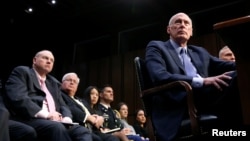U.S. intelligence chief Dan Coats said Tuesday that the U.S. must do more to deter attacks from Russia in the upcoming midterm elections.
Speaking to a Senate Armed Services Committee hearing on worldwide threats, Coats said the Trump administration's national security team was discussing a range of threats facing the U.S., but "there has not yet been a formulation of a lead agency that would work with Congress on legislative action and putting a policy in place."
The director of national intelligence said it was "highly likely" that Moscow would engage in a campaign of disruption, just as it did in the 2016 presidential election.
Coats told the lawmakers, "We assess that Russia is likely to continue to pursue even more aggressive cyberattacks with the intent of degrading our democratic values and weakening our alliances. Persistent and disruptive cyber and influence operations will continue against the United States and European countries and other allies." He said Moscow would be "using elections as opportunities to undermine democracy, sow discord and undermine our values."
Coats said that as soon as next week, he expected the U.S. Treasury to announce sanctions against 13 Russians accused by special counsel Robert Mueller of interference in the 2016 election. Coats suggested that sanctions also could be imposed on additional individuals as well.
Russia has rejected playing any role in the U.S. election, but the U.S. intelligence community has concluded it was directed by Russian President Vladimir Putin, who they say ran a huge but hidden social media trolling campaign aimed in part at helping President Donald Trump win.
Senator Richard Blumenthal, a Connecticut Democrat, asked Coats whether Trump had ever given him orders to retaliate against Russia. Coats said there were things the administration was doing, but that they could be discussed only in a classified session.
The Trump administration was harshly criticized for not imposing new sanctions in January when a list of 114 Russian politicians and 96 oligarchs was released to comply with a law Congress passed to punish Moscow for interfering in the 2016 U.S. election.
Coats said several U.S. agencies were "well aware" of the need for the government to protect against Russian election meddling in the U.S. But he was stumped when Senator Mazie Hirono, a Hawaii Democrat, asked him, "Why do we not have a whole-in-government strategy in place?"
"We understand it has to be addressed," Coats said. "I don't have a specific answer to your question."
'Not a top priority'
Hirono replied, "The conclusion is that this is not a top priority" for Trump after the U.S. intelligence community concluded that Russia's 2016 election meddling was aimed at helping him defeat his election challenger, Democrat Hillary Clinton.
On Tuesday, Trump said he wasn't worried that Moscow would meddle in the midterm elections because the U.S. would take steps to prevent it.
"Whatever they do, we'll counteract it very strongly," he said.
The president acknowledged that Russia interfered in the presidential election, but said it had no impact on the result.
"Certainly there was meddling, and probably there was meddling from other countries, and maybe other individuals," he said at a news conference with Swedish Prime Minister Stefan Löfven at the White House.
Trump said his administration was conducting a deep study and would have strong suggestions on protecting the midterms and beyond.
VOA's Jeff Seldin contributed to this report from the Pentagon.







